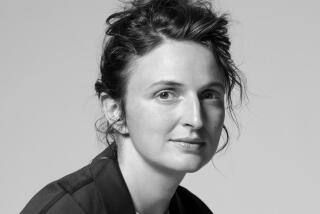MOVIE REVIEW : ‘Breath of Life’: Love Among the Ruins in Postwar Italy : Franco Nero and Lucrezia Lante Della Rovere discover romance in a Palermo TB sanitarium in 1946.
- Share via
Beppe Cino’s beautiful, contemplative “A Breath of Life” (at the Monica 4-Plex) tells a love story set in 1946 in a Palermo TB sanitarium. Adapted from a book by Gesualdo Bufalino, it is a minor film in the best sense, a touching, eloquent expression of love flourishing in an environment permeated with an overriding sense of mortality.
Throughout, Cino maintains a flawless sense of proportion and scale in his storytelling with the result that his film seems like a novella come to life. “A Breath of Life,” incidentally, was shown at the AFI Film Fest last June under the vague, off-putting title “The Plague Sower.”
When Angelo (Franco Nero), a diffident academic still wearing his wartime officer’s uniform, arrives at the sanitarium, a vast, crumbling palazzo only slightly smaller than Versailles, he is greeted by the worldly, insinuating director, Dr. Grifeo (Fernando Rey), who recognizes in Angelo a fellow intellectual.
The doctor, who estimates that only one out of three of his patients are curable, is a philosopher with a well-developed sense of the absurd and the macabre. To him, God is so indifferent that humans may as well be nothing more than gallstones, their deaths mere random expulsions from a metaphorical bladder. In time we learn that the source of the doctor’s acrid gallows humor goes beyond a response to the long-term impact of his work.
One evening Angelo attends a dance recital performed in the sanitarium’s auditorium by Marta (Lucrezia Lante Della Rovere), a former ballerina with La Scala. He’s as transfixed by her beauty as he’s alarmed by the fact that her performance is interrupted by severe coughing spells. He’s further horrified to learn that the doctor urges her on--and that she eagerly complies with his wishes. To her dancing means “coming to life.” In no time Angelo and the reckless, free-spirited Marta fall passionately in love.
In embarking on this most uncertain and tempestuous of affairs Angelo has no way of knowing that, as both Marta and the doctor reveal themselves and their secrets, he will emerge with a renewed sense of life’s meaning. It is a discovery that Cino wisely leaves implicit, and is indicative of the director’s finely honed sense of nuance and discretion. Cino also has that seemingly intuitive, characteristically Italian mastery of the sensual gesture, never better expressed than by one of the sanitarium’s nursing staff of dedicated nuns (Vanessa Redgrave) as she yields to the temptation of draping herself in a long golden chiffon that is part of Marta’s dancing costume.
Since this leisurely film is so well-modulated, romantic without being sentimental, it’s surprising that Cino allows “Cinema Paradiso’s” little Salvatore (Toto) Cascio, as the youngest of the patients and the lovers’ go-between, to get away with so much shameless old-fashioned kiddie star mugging. It’s only a minor irritant, standing out mainly because the other performances are so well-wrought--Rey and Della Rovere often rightly theatrical but never over the top, Nero and Redgrave understated yet capable of unexpected fireworks.
“A Breath of Life” (Times-rated Mature for adult themes, situations), sustained by Carlo Silliotto’s gentle, plaintive score, manages to be somber without being bleak and too warm and life-embracing to be depressing.
‘A Breath of Life’
Franco Nero: Angelo
Lucrezia Lante Della Rovere: Marta
Fernando Rey: Dr. Grifeo
Vanessa Redgrave: Sister Crocefissa
A Surf Films release of presentation of a Movie Machine production in collaboration with Rai 1. Director Beppe Cino. Producers Massimo Vigliar, Franco Nero. Executive producer Giuseppina Marotta. Screenplay by Cino, Gesualdo Bufalino; based on Bufalino’s “Diceria dell’Untore.” Cinematographer Franco Delli Colli. Editor Emanuele Foglietti. Costumes Francesca Sartori. Music Carlo Silliotto. Art director/Set designer Maurizio Leonardi. Running time: 1 hour, 30 minutes.
MPAA-rated Times-rated Mature (for adult themes, situations).
More to Read
Only good movies
Get the Indie Focus newsletter, Mark Olsen's weekly guide to the world of cinema.
You may occasionally receive promotional content from the Los Angeles Times.









